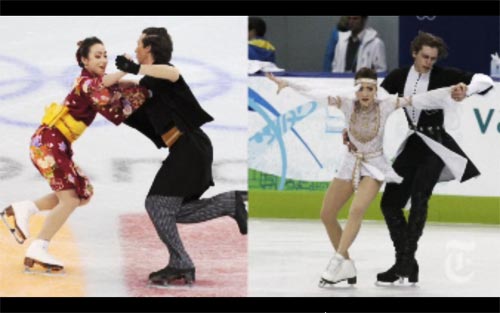Olympic contenders Allison, Cathy and Chris Reed are all siblings — but they are competing for two different countries.
The Reed children were born in Kalamazoo, Michigan, to a Japanese mother and a Nebraskan father. They all have dual-citizenships: United States and Japan. None of them are competing for the U.S. Olympic team.
Allison, 15, found an ice dancing partner in Otar Japaridze, 22, a Georgian athlete. For them to compete, the Georgian government quickly ushered her citizenship application through. This February, she marched as a Georgian athlete in the Olympic Opening Ceremonies. She has never been to Georgia.
For Allison’s siblings Cathy, 22, and Chris, 20, qualifying for the U.S. Olympic Team for ice dancing would’ve been very difficult. Instead, the two nabbed a spot on the Japanese Olympic team. According the New York Times, the siblings speak little Japanese, and their mother translates conversations between them and the Japanese skating federation.

Cathy and Chris Reed competing for Japan (left). Allison Reed and Otar Japaridze represent Georgia with a routine based on the country's folk dancing (right). New York Times.
Making citizenship “work for you” is not uncommon in sports. I’ve seen Singapore poach athletes from other countries to have them win for Singapore at sporting events. The country’s second-ever Olympic medal in 2008 was won by three Chinese-born table tennis athletes, brought in under the “Foreign Sports Talent” initiative.
For these passport-swapping athletes, where do their loyalties lie, or does it even matter? What does citizenship or national Olympic pride even mean? You may be marching to one flag, but your heart can be easily elsewhere. There are many athletes in Vancouver competing for countries that they do not call “home.” In today’s global environment, citizenship is merely a legal formality.
Allison is living the life of a TCK. She must embrace three cultures: Japan, Georgia and the United States. At the Olympics, she represents a country she has no cultural or familial ties to. But she chose this path. Her love for competition outweighed her national ties. She would rather compete for another country than not compete at all.
The Reed family’s global story is impressive. With an ability to navigate cultural boundaries, they are a truly international family. These athletes want to compete — and no borders will prevent them from doing what they love to do.
What do you think? Share your thoughts in the comments.
How funny! I was just thinking this…
LikeLike
fyi – Ashley Wagner is another TCK figure skater. http://en.wikipedia.org/wiki/Ashley_Wagner
LikeLike
There should be some minimum… Family ties or having at least been to the country.
LikeLike